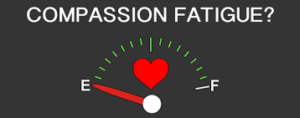Written By: Matt Driggers
 Perhaps now more than in the past, those in the helping profession are at risk of suffering from compassion fatigue. Managing our anxieties and caring for others in distress puts us at risk. It is an unavoidable truth that caregiving hurts. It is neither possible nor wise to avoid this pain. Feeling this pain is one of the things that makes us good at our jobs. However, to enjoy longevity as a caregiver requires us to learn how to stay emotionally healthy while working in what is, for all intents and purposes, a toxic environment.
Perhaps now more than in the past, those in the helping profession are at risk of suffering from compassion fatigue. Managing our anxieties and caring for others in distress puts us at risk. It is an unavoidable truth that caregiving hurts. It is neither possible nor wise to avoid this pain. Feeling this pain is one of the things that makes us good at our jobs. However, to enjoy longevity as a caregiver requires us to learn how to stay emotionally healthy while working in what is, for all intents and purposes, a toxic environment.
The Caregiver’s Journey
Understanding the five phases of a caregiver’s journey helps normalize the experience of compassion fatigue. The five phases are enthusiasm, frustration, compassion fatigue, resiliency development, and growth. In the enthusiasm phase, we are passionate about our work, ready to change the world and even welcome those problematic clients. Eventually, reality sets in, and we experience the frustration that comes when we realize some people don’t respond to our interventions. What follows is compassion fatigue and burn out. Compassion fatigue is a normal part of the caregiver’s journey. When faced with this inevitability, we must choose to succumb to the feeling and risk of leaving the profession or develop greater resilience and grow from the experience.
Defining Compassion Fatigue
Empathy is a core skill of the helping professions. When the compassion continues past our client sessions, our sympathetic nervous system, the part of our nervous system that activates our fight, flight, or freeze stress response, never rests. Compassion fatigue sets in when this stress continues over an extended time and combines with a perceived lack of resources to meet the demands. Symptoms include increased “sick days,” fatigue, an increase in cynicism, anger, hopelessness, intrusive thoughts, and decreased productivity.
Growing Through Compassion Fatigue
As noted above, compassion fatigue is inevitable. It is a part of the caregiver’s journey. Rather than discover how to avoid it, we should ask how to grow from it. What follows is a discussion of five cognitive shifts to help with professional development.
Learn to Self-Regulate
An essential skill in the face of compassion fatigue is that of self-regulation. Self-regulation is an active process done while listening to our clients. For relaxation, think beach. For regulation, think breathing. Specifically, deep diaphragmatic breathing, that focuses on relaxing your core muscles. This kind of breathing is associated with mindfulness meditation.
From Demand to Purpose
Nobody forced you into your profession. You made a choice. A good choice. A choice that for many helpers feels like an expression of who they are. In short, it is your unique contribution to this world. Reminding ourselves of our purpose helps move from demand-based caregiving to purpose-based caregiving. As helpers, we chose to show up to work every day. Not showing up may have financial and ethical consequences, but it is our choice to either show up or face these consequences.
Viewing work as an expression of your purpose changes our mindset from demand-based caregivers to purpose-based caregivers.
Let Go of Outcomes
Experiencing compassion fatigue is not a symbol of a deficit. It is a part of the growing pains of maturing as a caregiver. Maturing requires letting go of outcomes. The outcome of your work is none of your business. A client’s success is their responsibility. It is unfair for caregivers to put the burden of progress on our clients. When we do, it makes the caregiving process about us. Our job is to bring our best into our time with our clients, attune to the experiences, and respond with appropriate interventions. That’s it. We bring our best to our work. We are guides on the path; the journey of change ultimately belongs to our clients.
Let Go of Entitlement
Maturing as a caregiver requires letting go of entitlement. Entitlement in this context is the thought that our work owes us something. As professionals, we give a lot to our work. We invest in continuing education, using our resources to get better, and find more effective ways to reach people. We give a lot, and work asks for more. Entitlement creeps in when we begin expecting our vocation to give us something back.
Letting go of this entitlement involves realizing that work owes us nothing. Instead of work becoming a place we get something, work becomes a place to practice something. Work is a place to exercise our professional purpose. Shifting from demand-based caregiving to purpose-based caregiving helps release entitlement and allows work to become a place to live out our mission. The only thing work owes us a place to fulfill our professional purpose.
Accept Organization Demands
Whether you are a part of a multi-national corporation or a one-person small business, your organization is a system. The nature of all organizational systems is to demand more than you can give. If you find yourself feeling that there is always work to do – you’re right. Businesses and organizations require more. Let them. Our job is not to meet all the demands but rather to show up, bring our best, exercise our purpose, and hopefully return tomorrow and do it again.